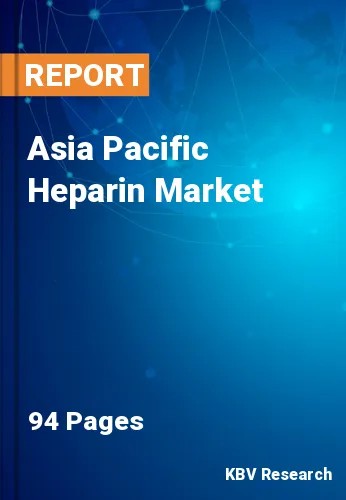The Asia Pacific Heparin Market would witness market growth of 7.8% CAGR during the forecast period (2021-2027).
Heparin refers to an anticoagulant compound that helps in preventing the formation of blood clots. It is used before surgery as it reduces the risk of blood clots in the arteries, veins, or lungs. Therefore, the demand for heparin has been increased over the past few years owing to the increasing geriatric population who are at greater risk of chronic diseases. There is increasing demand for these surgeries which, in turn, fuel the demand for heparin in the healthcare sector. These factors are likely to boost the growth of the market.
There is the availability of various synthetic and semi-synthetic heparin mimetics that are helpful in treating cancer, preventing blood coagulation during surgeries, and in the treatment of inflammatory diseases. This is the major factor which would offer lucrative opportunities for heparin adoption. Moreover, governments of various countries have undertaken initiatives to support healthcare infrastructure improvements. They are raising funds for comprehensive R&D activities that, in turn, fuel the development of new drugs with enhanced therapeutic potential. These factors are driving the growth of the heparin market during the forecast period. Organizations like the CDC and the National Institutes of Health (NIH) are also providing support for the R&D that will develop novel drugs and they have taken various initiatives programs to increase awareness among people.
The demand for heparin in the treatment of blood-related disorders is high in the Asia pacific. It is attributed to constantly improving healthcare infrastructure in this region. Apart from it, there i are many untapped opportunities and increasing initiatives undertaken by private and public organizations which are also contributing to the rapid growth of the heparin market in this region. Healthcare expenditure has also increased in past few years in developing nations. This is likely to have a tremendous effect on the heparin market in the Asia Pacific. For example, China is planning to improve its public health infrastructure that will boost the treatment capabilities of various diseases according to a plan that was released by the National Development and Reform Commission. The demand for heparin has been increased in China in the past decade. In the next decade, the production and demand for heparin are expected to grow.
The China market dominated the Asia Pacific Intravenous Market by Region 2020, thereby, achieving a market value of $280.2 million by 2027. The Japan market is showcasing a CAGR of 7.8% during (2021 - 2027). Additionally, The India market is anticipated to witness a CAGR of 9.1% during (2021 - 2027).
Based on Type, the market is segmented into Low Molecular Weight Heparin, Unfractionated Heparin and Ultra-low Molecular Weight Heparin. Based on Application, the market is segmented into Atrial Fibrillation, Coronary Artery Disease, Venous Thromboembolism, Renal Impairment and Other Applications. Based on Route of Administration, the market is segmented into Subcutaneous and Intravenous. Based on End Use, the market is segmented into Outpatient and Inpatient. Based on countries, the market is segmented into China, Japan, India, South Korea, Singapore, Malaysia, and Rest of Asia Pacific.
Free Valuable Insights: The Worldwide Heparin Market is Projected to reach USD 10 Billion by 2027, at a CAGR of 6.5%
The market research report covers the analysis of key stake holders of the market. Key companies profiled in the report include Baxter International, Inc., B. Braun Melsungen AG, Fresenius SE & Co. KGaA, Pfizer, Inc., Sanofi S.A., Teva Pharmaceuticals Industries Ltd., Hebei Changshan Biochemical Pharmaceutical Co., Ltd., Dr. Reddy’s Laboratories Ltd., LEO Pharma A/S, and Viatris, Inc.
By Type
By Application
By Route of Administration
By End Use
By Country
Our team of dedicated experts can provide you with attractive expansion opportunities for your business.

